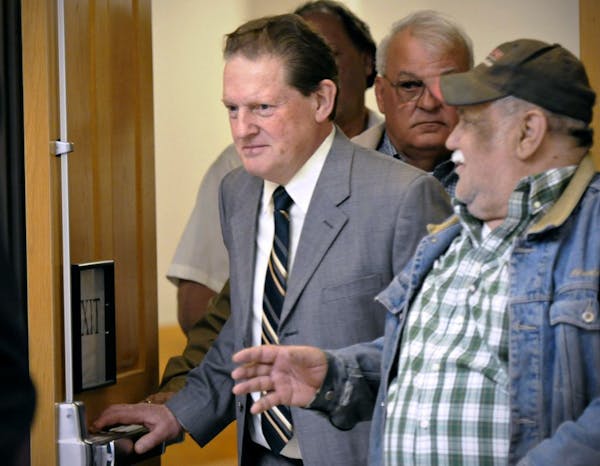LITTLE FALLS, MINN. – In the days and weeks before Byron Smith killed two teenage intruders in his home, neighbors and friends saw him sleep-deprived and scared because of prior burglaries, they testified Friday in Smith's nationally watched murder trial.
"He just looked very upset and fearful and shaky," longtime neighbor Georgia Anderson told the court, saying she almost didn't recognize Smith when he showed up at her door shortly after a burglary that took place a month before the shootings.
Defense attorneys continued to build their case that the former State Department worker had become increasingly afraid in the fall of 2012 after several break-ins to his home and his adjacent property.
Smith claims that he acted in defense of himself and his home when he killed 18-year-old Haile Kifer and 17-year-old Nick Brady, cousins who broke in and went down his basement steps about 10 minutes apart on Thanksgiving Day.
Prosecutors wrapped up their case Thursday after presenting Smith's own chilling surveillance audio of the shootings. They argue Smith waited in ambush for the teens and went beyond the law by shooting the teens after they were no longer a threat.
Smith faces life in prison if found guilty on charges of first-degree premeditated murder. The Morrison County jury will have to decide whether he acted as a reasonable person would have under the circumstances. The trial has become the latest flash point in the national debate over how far a person can go to defend self and property.
On Friday, William Anderson, Georgia's husband, testified for the defense that Smith came over after an Oct. 27 burglary appearing "severely" frightened. That break-in was "number 5 or 6," Anderson testified that Smith told him.
City alderman and cemetery superintendent Brian-Paul Crowder testified that he stopped by Smith's property the Saturday before the shootings and Smith looked afraid while answering the door. Smith was "terribly worried because he had been broken in so many times," Crowder said.
The testimony capped an often-contentious week among the lawyers trying the case, including Friday as the trial was delayed for several hours. Defense attorney Steve Meshbesher had tried to call a firearms expert to the stand to testify about the effects of shooting a gun, including adrenaline and auditory ringing. But after much discussion outside the courtroom, the judge ruled against allowing it.
Earlier Friday, sheriff's deputy Jamie Luberts testified that he had met with Smith for a follow-up to the burglary investigation in mid-November and discussed security cameras that Smith had installed.
Luberts testified that Smith told him he had been sticking around his property because he wanted to catch whoever was breaking in. Luberts said he told Smith that if he happened to catch anyone he should call the sheriff's office right away.
After the shootings, Smith waited until the following day to call Anderson, asking him to find him a lawyer, according to testimony. Anderson then alerted authorities at Smith's request, he said.
Under cross-examination from prosecutor Brent Wartner, Anderson testified that Smith told him he had "solved the break-ins in the neighborhood."
Anderson testified that he had "great suspicion" that a neighbor girl was watching Smith come and go from his property. But he denied telling Smith's brother that Smith had moved his truck the day of the shootings to see if anyone would come to his house when he was away.
Sheriff Michel Wetzel also took the stand. Defense attorneys questioned him about how, after the shootings, an unnamed person led Wetzel to a gun that had been stolen from Smith in a prior burglary.
Meshbesher said outside the courtroom that he wanted the jury to see photos of the 12-gauge semiautomatic shotgun so they could understand what Smith feared might be used against him by thieves.
Defense attorneys are not saying whether Smith will take the stand. Closing arguments are expected early next week.
Pam Louwagie • 612-673-7102

Should Hennepin County consider the race and gender of contractors it hires?
Search resumes in southwestern Minnesota for 15-year-old boy who jumped in lake after losing canoe oar

Hockey coach with roots in Minneapolis Park and Rec dies at 81

